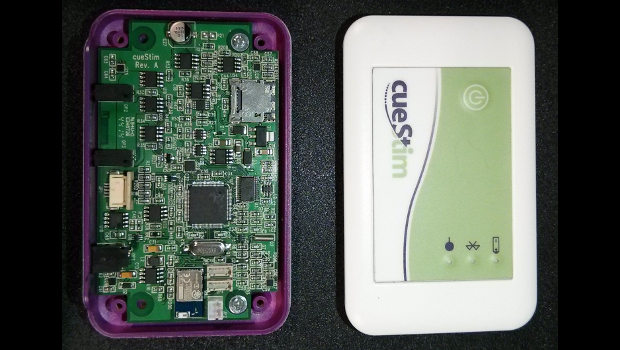Researchers at NUI Galway are developing a suite of unobtrusive, wearable electronic devices to help manage the debilitating symptom of Parkinson’s disease, referred to as ‘freezing of gait’.
The first generation of the system resulted from NUI Galway’s involvement in the €4.7 million European FP7 project, Rempark, which had 11 partners across Europe including NUI Galway. As part of this project the University has developed a wearable electronic device, cueStim, designed to prevent or relieve freezing of gait, described as a feeling of being stuck to the floor – a common cause of falls.
Dr Leo Quinlan, lecturer in Physiology at the School of Medicine in NUI Galway, and project co-principal investigator, said: “The severity of freezing of gait depends on the stage of the disease and it can have a very severe impact on quality of life, affecting people with Parkinson’s ability to walk for extended periods of time and is a common cause of falls.”
The Human Movement Laboratory at Curam, the SFI-backed centre for medical device research at NUI Galway, is working to enhance the technology, particularly in the area of usability and human factors through the project EScapeFOG. To achieve this goal, NUI Galway is partnering with Parkinson’s support groups to test and evaluate the usability and human factors of the system.
Prof Gearoid O Laighin, Professor of Electronic Engineering in the School of Engineering and Informatics at NUI Galway, and project Co-Principal Investigator, said: “We are using what is referred to as a user-centred design methodology, to ensure that the developed technology meets the needs of the intended users. This involves testing all aspects of the system with the Parkinson’s community and seeking their feedback on its usability throughout the design process.”
The Human Movement Laboratory at NUI Galway is involved in a collaboration with the Clare Parkinson’s Support Group on enhancing the design of the cueStim system, to meet the needs of people with Parkinson’s. A recent usability and human factors workshop held at the University was attended by 16 members of group.
The research was part-funded by the European Commission under the FP7 prgramme and Science Foundation Ireland.
TechCentral Reporters








Subscribers 0
Fans 0
Followers 0
Followers